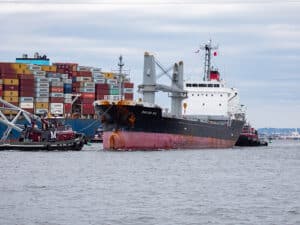
Shipping’s latest proposal to IMO is a Zero Emission Shipping Fund (ZESF)
Written by Nick Blenkey
Image: ICS/Shutterstock
Not for the first time, the International Chamber of Shipping (ICS) has submitted a proposal to the IMO for a mechanism that would help fund shipping’s transition to net zero emissions by 2050. A year ago, ICS submitted a proposal for a a “Fund and Reward” system. This time around, in a proposal cosponsored by the governments of two major flag states, Liberia and the Bahamas, ICS has submitted what, it says is a “detailed, fit-for-purpose proposal” for a Zero Emission Shipping Fund (ZESF).
The ZESF proposal builds on the “feebate” concept put forward by the Government of Japan and support from EU States at IMO for a flat rate “levy-based” global contribution system.
Significantly, says ICS, the updated proposal adds a structure for transparency and accountability for how the billions of dollars raised will be used, including those funds to be allocated for use in developing countries.
Under the proposal, contributions from ships per tonne of CO2e emitted will be used to reduce the significant cost gap between zero GHG fuels and conventional fuel oil, providing financial rewards (“feebates”) to ships for the GHG emissions prevented by use of these new marine fuels.
The transparent and accountable proposal will include support for the production of zero/near-zero marine fuels and the roll-out of new bunkering infrastructure in developing countries’ ports worldwide, as well as supporting training in the safe use of new fuels.
A detailed impact assessment has already been conducted by Clarksons Research for ICS that highlights that a contribution rate which adds a cost in a range between US$20 to $300 per tonne of fuel oil consumed would have no disproportionately negative impacts on national economies in terms of delivered cargo prices.
“The transition to net zero shipping must be truly global,” says ICS Secretary General, Guy Platten. “Otherwise, it will not succeed. ICS fully supports the net zero goal which IMO has agreed for shipping. The 2050 goal will only remain plausible if government negotiators now roll up their sleeves to develop the regulations needed to establish the Zero Emission Shipping Fund. A global GHG pricing mechanism for shipping urgently needs to be agreed on next year, which will de-risk investment in zero GHG marine fuels and provide billions of dollars of funds to support developing countries.
“The Governments of Bahamas and Liberia and the global shipping industry have come forward with a carefully thought-out mechanism, which is equitable, transparent and simple. The first IMO target for 2030 is less than six years away. If we don’t achieve a take-off point in the production and uptake of zero GHG marine fuels by 2030, it’s hard to see how net zero will be achieved by 2050.”
“The groundwork has been done and the regulatory architecture has been carefully laid out. All that is needed is political will from governments to implement this fit-for-purpose solution quickly and effectively.”
The Zero Emission Shipping Fund and the “feebate” mechanism will be considered by IMO Member States at their next round of GHG negotiations in March. Governments have already unanimously committed to developing a GHG pricing mechanism for international shipping by 2025, says ICS. If governments agree, the ZESF will be approved next year to help achieve net zero GHG emissions from shipping by or close to 2050, in line with the GHG reduction targets adopted by IMO Member States.
- Download the ZESF proposal HERE




